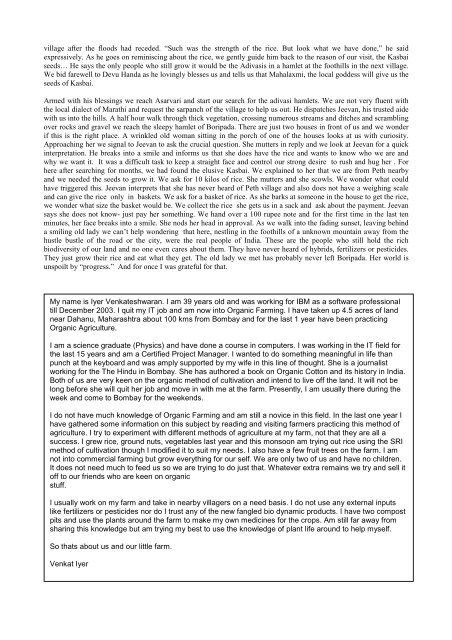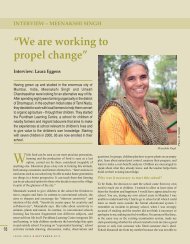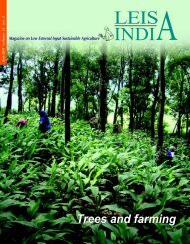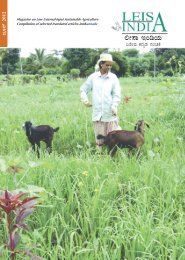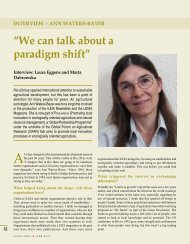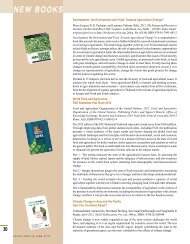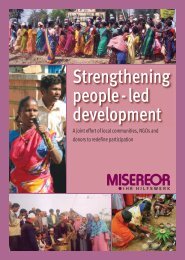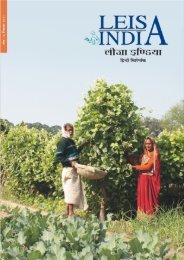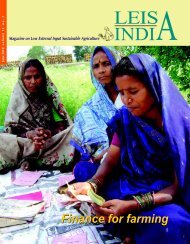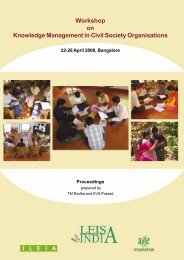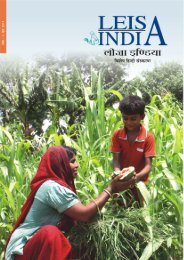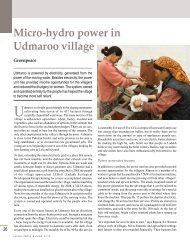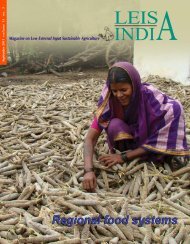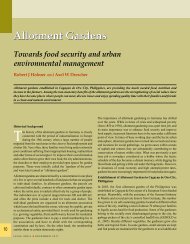The quest for Kasbai - Leisa India
The quest for Kasbai - Leisa India
The quest for Kasbai - Leisa India
- No tags were found...
You also want an ePaper? Increase the reach of your titles
YUMPU automatically turns print PDFs into web optimized ePapers that Google loves.
village after the floods had receded. “Such was the strength of the rice. But look what we have done,” he saidexpressively. As he goes on reminiscing about the rice, we gently guide him back to the reason of our visit, the <strong>Kasbai</strong>seeds… He says the only people who still grow it would be the Adivasis in a hamlet at the foothills in the next village.We bid farewell to Devu Handa as he lovingly blesses us and tells us that Mahalaxmi, the local goddess will give us theseeds of <strong>Kasbai</strong>.Armed with his blessings we reach Asarvari and start our search <strong>for</strong> the adivasi hamlets. We are not very fluent withthe local dialect of Marathi and re<strong>quest</strong> the sarpanch of the village to help us out. He dispatches Jeevan, his trusted aidewith us into the hills. A half hour walk through thick vegetation, crossing numerous streams and ditches and scramblingover rocks and gravel we reach the sleepy hamlet of Boripada. <strong>The</strong>re are just two houses in front of us and we wonderif this is the right place. A wrinkled old woman sitting in the porch of one of the houses looks at us with curiosity.Approaching her we signal to Jeevan to ask the crucial <strong>quest</strong>ion. She mutters in reply and we look at Jeevan <strong>for</strong> a quickinterpretation. He breaks into a smile and in<strong>for</strong>ms us that she does have the rice and wants to know who we are andwhy we want it. It was a difficult task to keep a straight face and control our strong desire to rush and hug her . Forhere after searching <strong>for</strong> months, we had found the elusive <strong>Kasbai</strong>. We explained to her that we are from Peth nearbyand we needed the seeds to grow it. We ask <strong>for</strong> 10 kilos of rice. She mutters and she scowls. We wonder what couldhave triggered this. Jeevan interprets that she has never heard of Peth village and also does not have a weighing scaleand can give the rice only in baskets. We ask <strong>for</strong> a basket of rice. As she barks at someone in the house to get the rice,we wonder what size the basket would be. We collect the rice she gets us in a sack and ask about the payment. Jeevansays she does not know- just pay her something. We hand over a 100 rupee note and <strong>for</strong> the first time in the last tenminutes, her face breaks into a smile. She nods her head in approval. As we walk into the fading sunset, leaving behinda smiling old lady we can’t help wondering that here, nestling in the foothills of a unknown mountain away from thehustle bustle of the road or the city, were the real people of <strong>India</strong>. <strong>The</strong>se are the people who still hold the richbiodiversity of our land and no one even cares about them. <strong>The</strong>y have never heard of hybrids, fertilizers or pesticides.<strong>The</strong>y just grow their rice and eat what they get. <strong>The</strong> old lady we met has probably never left Boripada. Her world isunspoilt by “progress.” And <strong>for</strong> once I was grateful <strong>for</strong> that.My name is Iyer Venkateshwaran. I am 39 years old and was working <strong>for</strong> IBM as a software professionaltill December 2003. I quit my IT job and am now into Organic Farming. I have taken up 4.5 acres of landnear Dahanu, Maharashtra about 100 kms from Bombay and <strong>for</strong> the last 1 year have been practicingOrganic Agriculture.I am a science graduate (Physics) and have done a course in computers. I was working in the IT field <strong>for</strong>the last 15 years and am a Certified Project Manager. I wanted to do something meaningful in life thanpunch at the keyboard and was amply supported by my wife in this line of thought. She is a journalistworking <strong>for</strong> the <strong>The</strong> Hindu in Bombay. She has authored a book on Organic Cotton and its history in <strong>India</strong>.Both of us are very keen on the organic method of cultivation and intend to live off the land. It will not belong be<strong>for</strong>e she will quit her job and move in with me at the farm. Presently, I am usually there during theweek and come to Bombay <strong>for</strong> the weekends.I do not have much knowledge of Organic Farming and am still a novice in this field. In the last one year Ihave gathered some in<strong>for</strong>mation on this subject by reading and visiting farmers practicing this method ofagriculture. I try to experiment with different methods of agriculture at my farm, not that they are all asuccess. I grew rice, ground nuts, vegetables last year and this monsoon am trying out rice using the SRImethod of cultivation though I modified it to suit my needs. I also have a few fruit trees on the farm. I amnot into commercial farming but grow everything <strong>for</strong> our self. We are only two of us and have no children.It does not need much to feed us so we are trying to do just that. Whatever extra remains we try and sell itoff to our friends who are keen on organicstuff.I usually work on my farm and take in nearby villagers on a need basis. I do not use any external inputslike fertilizers or pesticides nor do I trust any of the new fangled bio dynamic products. I have two compostpits and use the plants around the farm to make my own medicines <strong>for</strong> the crops. Am still far away fromsharing this knowledge but am trying my best to use the knowledge of plant life around to help myself.So thats about us and our little farm.Venkat Iyer


